Pony tails bob as a player stiff arms an opponent to ward off a tackle. Another dives headlong into a forming scrum. A third shouts unprintable words at the referee.
Meet the latest entrants in the world of international rugby -- the women's national teams of Laos and Cambodia.
It may not be World Cup action and the players average 1.5m, 40kg. But the fledgling athletes play their hearts out as they battle for the bottom rungs at the Southeast Asian Games, where the sport is being staged for the first time.
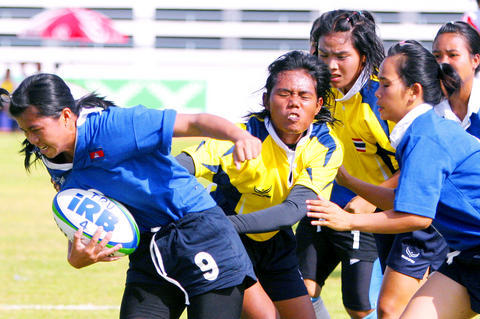
PHOTO: AP
The Cambodian team -- all orphans or daughters from poor families -- come off the field in tears as they go down 15-0 to Laos. One player is carried in pain and another limps into the locker room.
"I'm proud to be part of something that Cambodia has never had before -- rugby and we women playing it," says 20-year-old Tha Nita.
Women's rugby in Asia is not more than a decade old, but started in Cambodia only a year ago and in Laos a shade later, following on men's rugby which took root a few years earlier.
"A lot of the girls saw the guys playing rugby and said, `We'd like to try that,'" said Chris Mastaglio, a Briton who works for a non-governmental organization in Laos and who "moonlights" to assist the Laos Rugby Federation.
In both countries, foreign coaches started with the touch version of the game until the women asked for real, full contact rugby.
So far only the shortened seven-a-side rugby -- played at the Southeast Asian Games rather than 15-a-side -- has been introduced for women in both Laos and Cambodia.
"They're like the boys. They have the rugby spirit. And they're better students than the men," said Philippe Monnin, a French rubber planter and amateur rugby player who was key in establishing the sport in one of the world's most impoverished nations.
His Cambodian women's team, aged 15 to 22, are all supported by a private French group, Pour un Sourire d'Enfant (For the Smile of a Child), which provides deprived children with food and education.
Initially, he said, the new recruits were a tough, wary, "difficult" group. But that changed as the young women gained a sense of self-worth and also found a sense of trust in their coaches.
"They have the motivation. Being so poor, for them it's a great opportunity. Maybe it's not the best sport for women, but at least they become more confident, strong, less afraid," he said.
Both the women from Cambodia -- who had never been abroad -- and the Laos players were eager to hone their skills against more experienced foreign teams, even if it meant suffering some dire defeats.
At these games, with only four teams taking part, gold medalists Thailand and silver medalists Singapore were head and shoulders above Cambodia and Laos, who took the bronze.
The squad from Laos trained three times a week for nine months prior to the games.
Mastaglio says his relatively diminutive players were not daunted by their opponents.
"The law of physics does dictate a few things, but they are not bothered about their size. They really get stuck in," Mastaglio said.
The smaller build is a problem for all Asian teams when faced with the powerhouses of international women's rugby -- New Zealand, England, France, Canada, the US and others.
No Asian teams participated in the third women's World Cup in Edmonton, Canada, last year when New Zealand took the trophy for the third time.
"Physically there's definitely some disadvantage but as the sport grows in Asia, we'll develop and get better. It's a matter of time," said Shao Ing, a hooker for the Singapore team who finished fourth in last month's Asian Rugby Football Union Women's Championship -- a 15-a-side event.
Kazakhstan beat hosts China to win that tournament.
Ing, a legal counselor, got "hooked" about 10 years ago when she was introduced to rugby while studying at King's College, London.
"It's a real adrenalin rush, a lot of camaraderie and a good outlet for aggression," she said. "But above all it's a cerebral game. You have to be constantly thinking because there are so many things happening at the same time. It requires all your psychomotor skills."
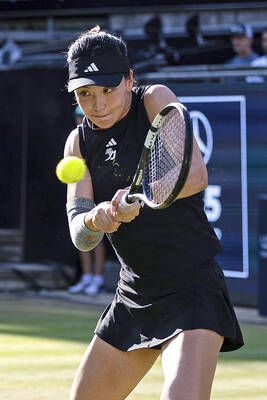
Twelve days after winning her second Grand Slam title at the French Open, Coco Gauff fell at the first hurdle on grass in Berlin on Thursday as beaten Paris finalist Aryna Sabalenka advanced to the quarter-finals. Recipient of a first round bye, American Gauff lost 6-3, 6-3 to Chinese qualifier Wang Xinyu as world number one Sabalenka beat Rebeka Masarova 6-2, 7-6 (8/6) in her second round tie. Winner of 10 main tour titles, including the US Open in 2023 and the WTA Finals last year, Gauff has yet to lift a trophy in a grass-court tournament. “After I won the first
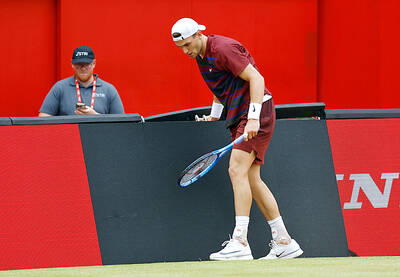
While British star Jack Draper spent the past week trying to find rhythm and comfort in his first grass tournament of the season at the Queen’s Club Championships in London, Jiri Lehecka on Saturday bulldozed everything in his path. After more than two furious hours of battle, their form was reflected in the final scoreline as Lehecka toppled a frustrated Draper, the second seed, 6-4, 4-6, 7-5 to reach the biggest final of his career, against Carlos Alcaraz. Lehecka is also the first Czech to reach the men’s title match at Queen’s since Ivan Lendl lifted the trophy in 1990. Draper, who
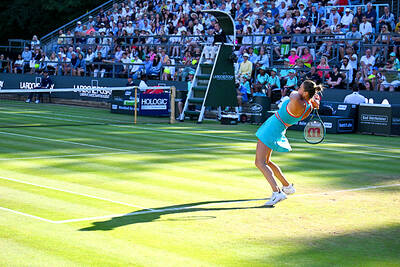
Top-ranked Aryna Sabalenka staged a “crazy comeback,” saving four match points before beating Elena Rybakina 7-6 (6), 3-6, 7-6 (6) in the quarter-finals of the Berlin Open on Friday. Sabalenka was 6-2 down in the final-set tie-breaker, but won six straight points to reach her eighth semi-final of the season. “Elena is a great player and we’ve had a lot of tough battles,” Sabalenka said. “I have no idea how I was able to win those last points. I think I just got lucky.” “I remember a long time ago when I was just starting, I won a lot of matches being down
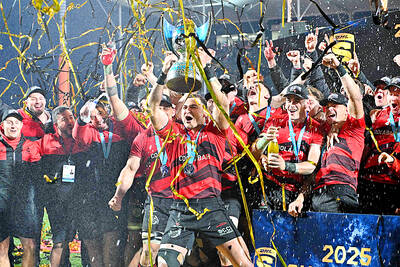
The Canterbury Crusaders edged the Waikato Chiefs 16-12 in an intense Super Rugby Pacific final battle in Christchurch yesterday to claim their 15th title in 30 years of the Southern Hemisphere competition. Hooker Codie Taylor scored a try and Rivez Reihana contributed 11 points from the kicking tee as the most dominant team in Super Rugby history extended their perfect home playoff record to 32 successive matches since 1998. The Chiefs, who were looking for a first title since 2013, scored first-half tries through George Dyer and Shaun Stevenson, but were unable to register a point after the break and fell to